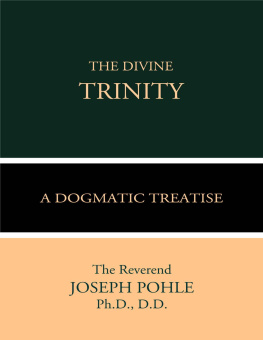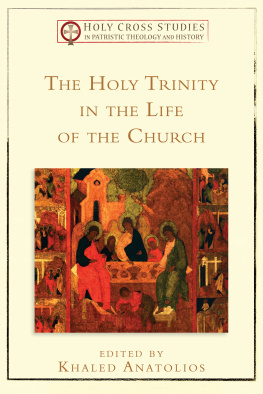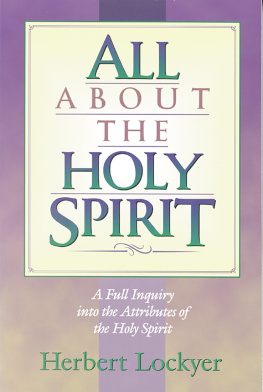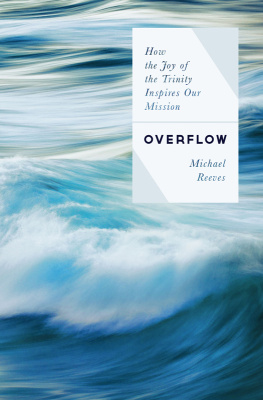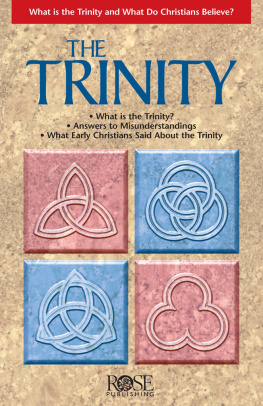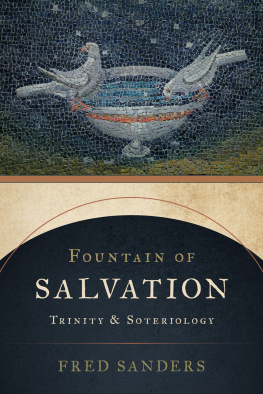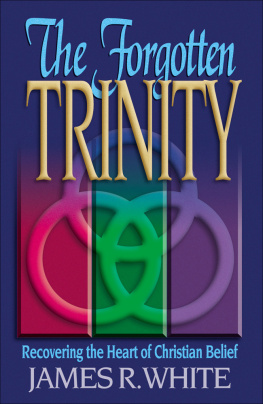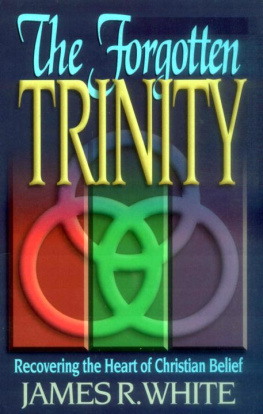I wish to express my indebtedness to James Hayes, ThD; for his help and encouragement. I owe much to Elizabeth Hopgood, MA; for her direction and for discussing and delighting in historical theology and the Holy Trinity with me. I wish to thank Stephanie Hopgood, Doctoral Candidate; for typing the manuscript and providing both theological and editorial insights. I also wish to thank Pastor Stefan Lindblad, Doctoral Candidate; and Pastor Stephan Hicks, MB; for their advice and insights; and Deacon Gary Wilkinson and Deacon Paul Nemeth for reading the manuscript. Special thanks goes to Gloria Gaupp, MA; for critiquing and correcting the grammar. Soli Deo Gloria .
Introduction
Earth shadows on the sky are caused by the suns rays striking a geographical body (such as a mountain) at a low angle, causing its shadow to be projected upward. From mans limited perspective he is continually in danger of projecting his own conceptions and theories upward onto God instead of receiving the image of God through revelation from above.
It is right for the ordinary Christianand for the philosopher too, for when he stands at the font or kneels at the altar he is as ordinary as anyone elseto state his faith in the most commonplace and straightforward way that he can; but it is also necessary to remember that because we are enmeshed in the created orderbecause we are, so to speak, at the thin end of the Creator-creation relationwe habitually see everything upside down.
The outworking of this inverted view of God is most evident in theology regarding Gods sovereignty and the freedom of mans will. Misconceptions of Gods sovereignty spring from misconceptions of Gods nature, or ontology, due to the application of humanistic, anthropocentric reasoning as evidenced in the primacy of the doctrine of soteriology and subordinationism in the doctrine of the Trinity in the teachings of Charles Chauncy ( 1705 1787 ) and John Gill ( 1697 1771 ).
A study of the writings of Charles Chauncy and John Gill is a study in comparison and contrast. Charles Chauncy, a proto-Unitarian Universalist, and John Gill, a committed Trinitarian with hyper-Calvinist leanings, both reveal the influx of rationalism in their interpretation of Scripture. Both men had a spiritual background in the Puritan strain of the Reformed tradition; both were well studied in the current theological and philosophical theories of their day. That both should exhibit to different degrees the same doctrinal weaknesses regarding the nature of God and incorrect, though opposite, views of Gods sovereignty demonstrates that those dangers do not lie merely in ones position on predestination or mans free will. The real problem lies in the misconceptions of Gods nature that, in turn, arise from a wrong view of the relation of reason to Scripture.
Although leaders of their respective movements, Charles Chauncy and John Gill have received a great amount of bad press during their lifetimes and since. Such ad hominem attacks fail to acknowledge that these men were zealous for the right understanding of doctrine and for the good of their fellow men. In failing to recognize this, the critics fail to detect where the two men went astray. The result is that the critics can and do fall into the same errors; therefore, the point is to learn from these two mens mistakes.
As leaders, Charles Chauncy and John Gill did not begin movements as much as crystalize and systematize teachings that had been developing in a broad, undefined manner. Both men were widely read and had superior mental faculties. Furthermore, both desired to preserve and advance the doctrines that they had received. Unfortunately, their writings do not evidence serious attempts to evaluate those received doctrines by Scripture as a whole but merely to support them by individual Scripture texts. Such mental confines are by no means unique to the Puritans. People from all eras have worked to reconcile to the point of absurdity the differences within the theological and philosophical concepts they have received without stopping to consider whether those concepts accorded with divine revelation or if other orthodox possibilities existed.
Yet Charles Chauncy and John Gill were indeed leaders. The philosophically adapted theology that they consolidated has affected thousands until this present time, especially in America. Most significantly, the definition they gave to their opposing schools of thought makes their writings valuable in identifying the errors to which all Christians are prone.
This book focuses not as much on the questions concerning sovereignty as what questions should or should not be asked and how those questions should be approached. In order to obtain a clearer view of theological concepts and to situate the persons in their proper historical context, terms and positions are defined by the ancient ecumenical councils and creeds, as well as the writings of the Protestant Reformers. Although the general Puritan background of Charles Chauncy and John Gill is briefly described, the doctrinal teachings of these men are chiefly represented by their own writings.
Furthermore this study relies on the excellent work that has already been done regarding the doctrine of the Trinity, especially in its historical development. Hopefully, as this is brought together with the seventeenth- and eighteenth-century writings, some light may be shed on the sovereignty debates. However the study assumes that though the church as a whole increases in knowledge of God, true theology supersedes any single historical setting.
Thus we may be saved from committing that peculiar sin against history which consists in reading back into the documents or the formulas of an earlier period ideas or conceptions which properly belong to a later one. But if this be the peculiar transgression which violates the true historical method, it is at the same time to be borne in mind that this very fact implies that due weight is to be given to formal or logical considerations, as well as those that are specifically historical. For chronological sequence is not the only kind of sequence; there is a sequence of thought which is independent of time; and of this fact historical students need to sometimes be reminded.
Herein lies the benefit of historical theology for today.
H. A. Hopgood, ThD, DREd
Reformation Day, 2018
. Mascall, Christ, the Christian, and the Church , .
. See Oliver, John Gill ( 1697 1771 ), . This has proved true of Charles Chauncy also.
. Bishop, Development of Trinitarian Doctrine, 1920 .
Scripture is the source of all truth for theology. Because of this fact nearly all theologians have referenced, if not relied on, Scripture for their study, whether they lived before AD or after AD 1500 . However, while they assert a common claim that each ones theology is scriptural, various opposing theologies do exist. It is somewhat disconcerting to realize that Christian theologians who have appealed to the same biblical authority have not infrequently drawn opposite, or nearly opposite, doctrinal conclusions. If it is assumed that Scripture does not contradict itself and cannot be read with contradictory meanings regarding those truths which pertain to Gods nature and mans eternal salvation, whence come these mutually exclusive doctrines? The answer lies in how Scripture is employed.


